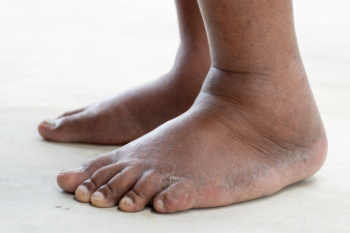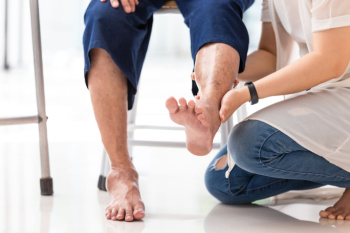
Swollen feet are a common concern during pregnancy, usually caused by increased fluid retention and pressure on blood vessels from the growing uterus , which slows circulation. Hormonal changes can also affect blood flow and contribute to swelling. Risk factors include standing for long periods of time, hot weather, poor circulation, and excessive weight gain. Symptoms include puffiness in the feet and ankles, a heavy sensation, and discomfort when walking. While swelling is usually harmless, it can interfere with daily activities. A podiatrist can evaluate foot health, recommend supportive footwear, suggest gentle exercises, and offer treatment to improve circulation. If your feet have become swollen during your pregnancy, it is suggested that you consult a podiatrist who can offer you effective relief tips.
Swollen feet can be a sign of an underlying condition. If you have any concerns, contact Dr. Richard T. Bauer of Summit Foot & Ankle. Our doctor can provide the care you need to keep you pain-free and on your feet.
Swollen feet are a common ailment among pregnant women and people who stand or sit for extended periods. Aging may increase the possibility of swollen feet and patients who are obese often notice when their feet are swelling too. There may be medical reasons why swollen feet occur:
- Phlebitis - A condition that causes the veins to become inflamed and can also cause leg pain.
- Liver disease - This may lead to low blood levels of albumin which is a protein. This can cause fluid in the blood to pass into the tissues and several areas of the body can become swollen.
- Heart failure - When the heart doesn’t pump properly the blood that is normally pumped back to the heart can pool in the veins of the legs causing swollen feet.
- Kidney disease - One of the main functions of the kidneys is releasing excess fluid in the body. This type of condition can make it difficult for the kidneys to function properly, and as a result the feet may become swollen.
- Deep-vein thrombosis (DVT)- This is a serious condition where blood clots form in the veins of the legs. They can block the return of blood from the legs to the heart which may cause the feet to swell. It is important to be treated by a podiatrist if this condition is present.
Swollen feet can also be caused by bone and tendon conditions, including fractures, arthritis, and tendinitis. Additionally, there may be skin and toenail conditions and an infection may cause the feet to swell. Patients who take medicine to treat high blood pressure may be prone to getting swollen feet.
Many patients elevate their feet to help relieve the swelling and this is generally a temporary remedy. When a podiatrist is consulted the reason behind the swelling can be uncovered and subsequently treated.
If you have any questions please feel free to contact our office located in Latham, NY . We offer the newest diagnostic tools and technology to treat your foot and ankle needs.

The feet can offer important clues about your overall health. Dark spots or unusual discoloration under the toenails may indicate melanoma, a serious form of skin cancer. Horizontal or vertical lines in the nails may suggest low levels of magnesium, zinc, or certain vitamins. Chipped or cracked toenails may be linked to digestive or gut health issues that affect nutrient absorption. These visible changes should not be ignored, as they may reflect deeper systemic concerns. A podiatrist can help identify the underlying cause of these signs through a thorough examination while offering treatment to support both foot and general wellness. If you have foot pain or notice changes to your feet, it is suggested that you consult a podiatrist who can help you with overall foot health.
When dealing with systemic disease of the feet, it is extremely important to check the affected areas routinely so that any additional problems are caught quickly. If you have any concerns about your feet and ankles contact Dr. Richard T. Bauer from Summit Foot & Ankle. Our doctor will assist you with all of your podiatric needs.
Systemic Diseases of the Feet
Systemic diseases affect the whole body, and symptoms usually are displayed in the feet. This condition can make a patient’s ability to walk unbearable. Systemic diseases include gout, diabetes mellitus, neurological disorders, and arthritis.
Gout – is caused by an excess of uric acid in the body. Common symptoms include pain, inflammation, and redness at the metatarsal/phalangeal joint of the base big toe. Gout can be treated by NSAIDs to relieve pain and inflammation, and other drugs that lower the acid levels in the body.
Diabetes mellitus – is an increase in the level of blood sugar that the body cannot counteract with its own insulin. Failure to produce enough insulin is a factor in Diabetes.
Diabetes of the Feet
Diabetic Neuropathy – may lead to damaged nerves and affect the feet through numbness and loss of sensation.
Peripheral Vascular Disease – can restrict the blood flow to the feet, and often times lead to amputation of the feet.
If you have any questions please feel free to contact our office located in Latham, NY . We offer the newest diagnostic and treatment technologies for all your foot and ankle needs.

Gout is a chronic inflammatory form of arthritis that often affects the joints of the feet, particularly the big toe. During a gout flare-up, the affected joint may become intensely painful, swollen, and red due to the buildup of uric acid crystals. While there is no cure for gout, medical treatment can help reduce the frequency and intensity of flare-ups and limit joint damage. A podiatrist can diagnose gout and recommend treatment options that lower uric acid levels and manage inflammation. These may include medication that reduces pain and swelling, as well as long-term prescriptions aimed at preventing recurrences. Without proper treatment, gout may lead to joint deformity or permanent damage in the feet or ankles. Timely care from a podiatrist can shorten flare-ups, which typically peak within 24 hours and may last several days. If you suffer from flare-ups of gout, it is suggested that you schedule regular appointments with a podiatrist for ongoing treatment.
Gout is a painful condition that can be treated. If you are seeking treatment, contact Dr. Richard T. Bauer from Summit Foot & Ankle. Our doctor will treat your foot and ankle needs.
What Is Gout?
Gout is a form of arthritis that is characterized by sudden, severe attacks of pain, redness, and tenderness in the joints. The condition usually affects the joint at the base of the big toe. A gout attack can occur at any random time, such as the middle of the night while you are asleep.
Symptoms
- Intense Joint Pain - Usually around the large joint of your big toe, and it most severe within the first four to twelve hours
- Lingering Discomfort - Joint discomfort may last from a few days to a few weeks
- Inflammation and Redness -Affected joints may become swollen, tender, warm and red
- Limited Range of Motion - May experience a decrease in joint mobility
Risk Factors
- Genetics - If family members have gout, you’re more likely to have it
- Medications - Diuretic medications can raise uric acid levels
- Gender/Age - Gout is more common in men until the age of 60. It is believed that estrogen protects women until that point
- Diet - Eating red meat and shellfish increases your risk
- Alcohol - Having more than two alcoholic drinks per day increases your risk
- Obesity - Obese people are at a higher risk for gout
Prior to visiting your podiatrist to receive treatment for gout, there are a few things you should do beforehand. If you have gout you should write down your symptoms--including when they started and how often you experience them, important medical information you may have, and any questions you may have. Writing down these three things will help your podiatrist in assessing your specific situation so that he or she may provide the best route of treatment for you.
If you have any questions, please feel free to contact our office located in Latham, NY . We offer the newest diagnostic and treatment technologies for all your foot care needs.

